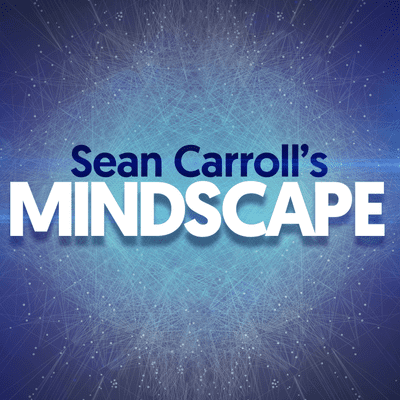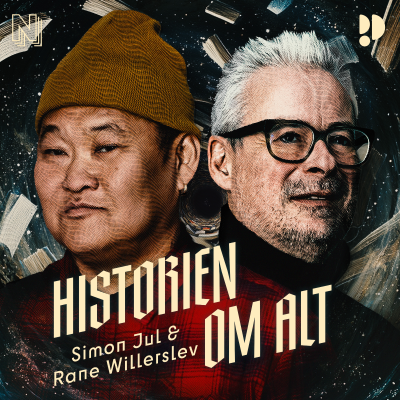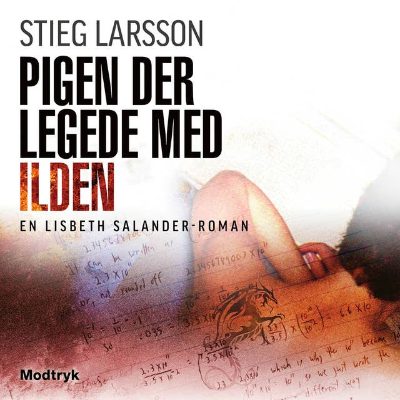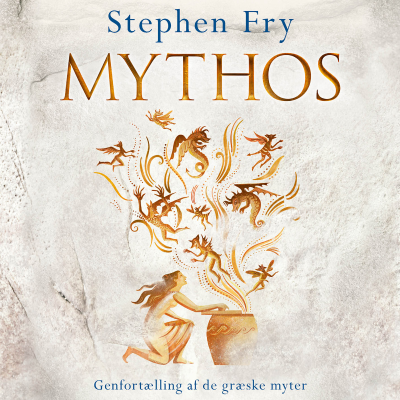
Sean Carroll's Mindscape: Science, Society, Philosophy, Culture, Arts, and Ideas
Podcast af Sean Carroll | Wondery
Prøv gratis i 7 dage
99 kr. / måned efter prøveperiode.Ingen binding.

Mere end 1 million lyttere
Du vil elske Podimo, og du er ikke alene
Rated 4.7 in the App Store
Læs mere Sean Carroll's Mindscape: Science, Society, Philosophy, Culture, Arts, and Ideas
Ever wanted to know how music affects your brain, what quantum mechanics really is, or how black holes work? Do you wonder why you get emotional each time you see a certain movie, or how on earth video games are designed? Then you’ve come to the right place. Each week, Sean Carroll will host conversations with some of the most interesting thinkers in the world. From neuroscientists and engineers to authors and television producers, Sean and his guests talk about the biggest ideas in science, philosophy, culture and much more.
Alle episoder
402 episoderIt is not manifestly obvious that universities should be where most scholarly research is performed. One could imagine systems that separated out the tasks of "teaching students" and "generating new knowledge." But it turns out that combining them yields spectacular synergies, both from letting students experience cutting-edge research and from keeping researchers inspired by interacting with bright young minds. Today we talk to Elizabeth Mynatt, Dean of Computer Sciences at Northeastern, both about her own research in "human-centered computing," and about the bigger-picture issues of why basic research is important, and why universities are such good places to do it. Blog post with transcript: https://www.preposterousuniverse.com/podcast/2025/08/11/324-elizabeth-mynatt-on-universities-and-the-importance-of-basic-research/ [https://www.preposterousuniverse.com/podcast/2025/08/11/324-elizabeth-mynatt-on-universities-and-the-importance-of-basic-research/] Support Mindscape on Patreon [https://www.patreon.com/seanmcarroll]. Elizabeth Mynatt received a Ph.D. in computer science from the Georgia Institute of Technology. She is currently Dean of the Khoury College of Computer Sciences at Northeastern University. She is a senior investigator with Emory’s Cognitive Empowerment Program and co-PI for the NSF AI-CARING Institute. She is a fellow of the Association for Computing Machinery and the American Association for the Advancement of Science, and a member of the American Academy of Arts and Sciences. She was lead author on the National Academies report, "Information Technology Innovation: Resurgence, Confluence, and Continuing Impact [https://nap.nationalacademies.org/catalog/25961/information-technology-innovation-resurgence-confluence-and-continuing-impact]." * Web page [https://www.khoury.northeastern.edu/people/elizabeth-mynatt/] * Google Scholar publications [https://scholar.google.com/citations?user=l7nsfT4AAAAJ&hl=en] * Wikipedia [https://en.wikipedia.org/wiki/Elizabeth_Mynatt] See Privacy Policy at https://art19.com/privacy [https://art19.com/privacy] and California Privacy Notice at https://art19.com/privacy#do-not-sell-my-info [https://art19.com/privacy#do-not-sell-my-info].
Welcome to the August 2025 Ask Me Anything episode of Mindscape! These monthly excursions are funded by Patreon supporters [https://www.patreon.com/seanmcarroll] (who are also the ones asking the questions). We take questions asked by Patreons, whittle them down to a more manageable number -- based primarily on whether I have anything interesting to say about them, not whether the questions themselves are good -- and sometimes group them together if they are about a similar topic. Enjoy! Blog post with questions and transcript: https://www.preposterousuniverse.com/podcast/2025/08/04/ama-august-2025/ [https://www.preposterousuniverse.com/podcast/2025/08/04/ama-august-2025/] Support Mindscape on Patreon [https://www.patreon.com/seanmcarroll]. See Privacy Policy at https://art19.com/privacy [https://art19.com/privacy] and California Privacy Notice at https://art19.com/privacy#do-not-sell-my-info [https://art19.com/privacy#do-not-sell-my-info].
The search for a foundational theory of quantum mechanics that all physicists can agree on remains active. Over the last century a number of contenders have emerged, including Many-Worlds, pilot-wave theories, and others, but all of them have aspects that many people object to. Jacob Barandes has taken up the challenge, proposing a new formulation of quantum theory [https://arxiv.org/abs/2402.16935] in which there is no wave function, only real degrees of freedom with fundamentally stochastic dynamics. We talk about this new theory and the challenges facing it. Blog post with transcript: https://www.preposterousuniverse.com/podcast/2025/07/28/323-jacob-barandes-on-indivisible-stochastic-quantum-mechanics/ [https://www.preposterousuniverse.com/podcast/2025/07/28/323-jacob-barandes-on-indivisible-stochastic-quantum-mechanics/] Support Mindscape on Patreon [https://www.patreon.com/seanmcarroll]. Jacob Barandes received his Ph.D. in physics from Harvard University. He is currently Senior Preceptor in Physics and Associated Faculty in Philosophy at Harvard. He teaches both physics and philosophy courses at Harvard, where he has been the recipient of several teaching awards. * Web site [https://www.jacobbarandes.com/] * Harvard web page [https://www.physics.harvard.edu/people/facpages/barandes] * PhilPeople profile [https://philpeople.org/profiles/jacob-barandes] * Google scholar publications [https://scholar.google.com/citations?user=BepZY0gAAAAJ&hl=en] See Privacy Policy at https://art19.com/privacy [https://art19.com/privacy] and California Privacy Notice at https://art19.com/privacy#do-not-sell-my-info [https://art19.com/privacy#do-not-sell-my-info].
When we think of the capacities that distinguish humans from other species, we generally turn to intelligence and its byproducts, including our technological prowess. But our intelligence is highly connected to our ability to use language, which is in turn closely related to our capacities as social creatures. Philosopher Philip Pettit would encourage us to think of those social capacities, as enabled by language, as the primary locus of what makes humans different, as discussed in his new book When Minds Converse: A Social Genealogy of the Human Soul [https://www.amazon.com/When-Minds-Converse-Social-Genealogy/dp/019886311X]. And that linguistic aptitude helps us understand the nature of agency, responsibility, and freedom. Blog post with transcript: https://www.preposterousuniverse.com/podcast/2025/07/21/322-philip-pettit-on-language-agency-politics-and-freedom/ [https://www.preposterousuniverse.com/podcast/2025/07/21/322-philip-pettit-on-language-agency-politics-and-freedom/] Support Mindscape on Patreon [https://www.patreon.com/seanmcarroll]. Philip Pettit received his Ph.D. in philosophy from University College Belfast. He is currently Laurance S. Rockefeller University Professor of Human Values at Princeton University and Distinguished University Professor of Philosophy at Australian National University. He is a Fellow of the Academy of Social Sciences in Australia, the Australian Academy of the Humanities, the American Academy of Arts and Sciences, and the Guggenheim Foundation, among other honors. * Princeton web page [https://www.princeton.edu/~ppettit/] * Google Scholar publications [https://scholar.google.com/citations?user=jQNfOoEAAAAJ&hl=en] * Wikipedia [https://en.wikipedia.org/wiki/Philip_Pettit] * Amazon author page [https://www.amazon.com/stores/Philip-Pettit/author/B00J0ZZI0I] See Privacy Policy at https://art19.com/privacy [https://art19.com/privacy] and California Privacy Notice at https://art19.com/privacy#do-not-sell-my-info [https://art19.com/privacy#do-not-sell-my-info].
Quantum field theory is the basis for our most successful theories of fundamental physics. And yet, there are things we don't understand about it. Some of these puzzles are relatively well-known, while others are less celebrated. David Tong joins us to talk about some of the more interesting and perplexing aspects of quantum field theory. He also discusses his new project to write a series of textbooks covering (all?) important topics in theoretical physics. To date, these include Classical Mechanics [http://www.damtp.cam.ac.uk/user/tong/books/classical.html], Quantum Mechanics [http://www.damtp.cam.ac.uk/user/tong/books/quantum.html], Fluid Mechanics [http://www.damtp.cam.ac.uk/user/tong/books/fluids.html], and Electromagnetism [http://www.damtp.cam.ac.uk/user/tong/books/electro.html]. Blog post with transcript: https://www.preposterousuniverse.com/podcast/2025/07/14/321-david-tong-on-open-questions-in-quantum-field-theory/ [https://www.preposterousuniverse.com/podcast/2025/07/14/321-david-tong-on-open-questions-in-quantum-field-theory/] Support Mindscape on Patreon [https://www.patreon.com/seanmcarroll]. David Tong received his Ph.D. in theoretical physics from Swansea University. He is currently a professor of Theoretical Physics in the Department of Applied Mathematics and Theoretical Physics at the University of Cambridge. He is a winner of the Adams Prize and a Simons Investigator. In addition to his books, he has written many freely-available sets of lecture notes [https://www.damtp.cam.ac.uk/user/tong/teaching.html] on topics in physics. * Cambridge web page [https://www.damtp.cam.ac.uk/user/tong/] * Google Scholar publications [https://scholar.google.com/citations?user=felFiY4AAAAJ&hl=en] * Amazon author page [https://www.amazon.com/stores/Dr-David-Tong/author/B00OH8ZMA4] * Wikipedia [https://en.wikipedia.org/wiki/David_Tong_(physicist)] * Royal Institution lecture on quantum field theory [https://www.youtube.com/watch?v=zNVQfWC_evg&ab_channel=TheRoyalInstitution] See Privacy Policy at https://art19.com/privacy [https://art19.com/privacy] and California Privacy Notice at https://art19.com/privacy#do-not-sell-my-info [https://art19.com/privacy#do-not-sell-my-info].

Rated 4.7 in the App Store
Prøv gratis i 7 dage
99 kr. / måned efter prøveperiode.Ingen binding.
Eksklusive podcasts
Uden reklamer
Gratis podcasts
Lydbøger
20 timer / måned

































